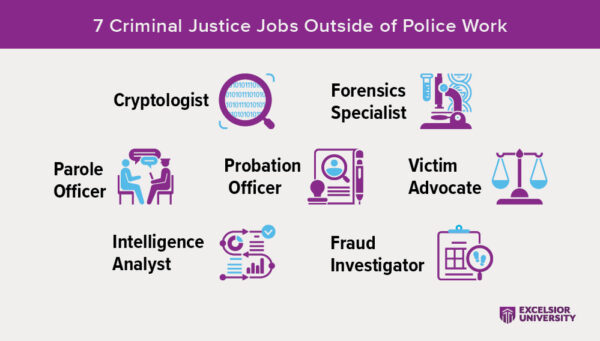7 Criminal Justice Jobs Outside of Police Work

When most people think of criminal justice, they probably think of police officers patrolling the streets or well-dressed lawyers prosecuting criminals in courtrooms. These are apt examples of careers you can land with a criminal justice degree, but while noble pursuits, they aren’t the only jobs available in the field. In fact, there are plenty of other careers that don’t relate to police work or courtrooms at all that you can set your sights on with a criminal justice degree in hand.
What Jobs Can You Get with a Criminal Justice Degree?
If you have your heart set on earning a criminal justice degree but want to explore other careers besides the common ones in law enforcement, don’t worry; there are plenty of roles to choose from. From forensics to intelligence, you’re bound to find the position that meets your interests and goals.
Cryptologist
Cryptologists use encryption and decryption tools and software to ensure secure communication. They encrypt data, design and analyze surveys, interpret and present data, create visual aids for decision-making, and apply mathematical theories to solve problems. Unlike cryptographers, who only create codes, cryptologists create and break them.
Forensics Specialist
A forensics specialist collects, analyzes, and preserves evidence at crime scenes or in labs. They work with law enforcement to identify, document, and ensure that evidence is usable in court. Some forensics specialists might focus their work in areas like forensic psychology or DNA analysis. They may also testify in court to explain their findings.
Parole Officer
If you’re interested in helping the incarcerated population reintegrate with society, a career as a parole officer might be right for you. Parole officers make sure that individuals released from prison follow parole conditions. They help parolees return to society by regularly meeting with them, overseeing drug testing, securing housing, assisting with employment or education, and connecting them to substance abuse treatment programs. They may also conduct home searches and make arrests.
Probation Officer
Probation officers also work with criminal offenders, but in a slightly different way. Probation officers supervise individuals serving community-based sentences, making sure they follow court-ordered conditions. They develop supervision plans, conduct drug testing and home visits, and provide counseling and support services. The difference between probation officers and parole officers is that probation officers work with unincarcerated people serving community sentences, whereas parole officers work with people who have already served part of their sentence in prison.
Victim Advocate
If you would prefer directly helping victims of crimes, a career as a victim advocate might be for you. Victim advocates support victims of crimes by providing emotional support, information on rights, and assistance with resources and legal processes. They often support victims through criminal justice proceedings. Some advocates may even be survivors themselves.
Intelligence Analyst
Intelligence analysts monitor and analyze data to identify security threats and develop risk mitigation strategies. They monitor forms of communication for breaches, create filtering programs to identify risks, conduct risk assessments, and create reports with security recommendations. They often work with law enforcement agencies, the government, the military, private intelligence agencies, and more.
Fraud Investigator
Fraud investigators analyze credit card and insurance fraud cases. They work in industries like finance, insurance, and government. Their job is to identify threats, develop fraud prevention systems, and collaborate with banks and law enforcement. Their work includes investigating security breaches, creating fraud analysis models, documenting cases, and interviewing suspects.

How to Start Your Criminal Justice Career
You don’t have to become a police officer to follow a career path in criminal justice. There are myriad career opportunities for you to explore, from forensics specialist to victim advocate. All these careers have one thing in common, though: a criminal justice degree. The right program can teach you the psychological, sociological, and criminological theories of criminal justice, as well supply you with the knowledge and skills you need to start a career anywhere in the field—even if it’s not with your local police department.



